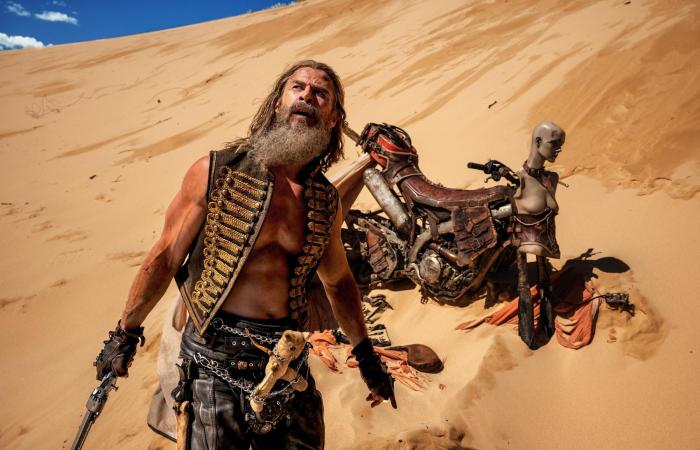Of Andrea Berneschi
It was 2015 and we entered the cinema intrigued by the trailer of what would have been the fourth film in the series Mad Maxan absolute cult of the 80s and a harbinger of derivations in every other expressive medium (for one thing, Hokuto no Ken by Buronson and Tetsuo Hara). This film felt different from the rest of the series, and not just because of the absence of Mel Gibson. It seemed like a treatise on the anthropology of the future, rather than a typical one action movie Hollywood; although the trailer showed chases, clashes and explosions at will, our attention went above all to the strange tribes of warriors and their vehicles, relics of a totally other compared to us. Two hours after entering the theater we emerged stunned, fascinated by a work of art that no one, except director George Miller, had imagined could be created with cameras, beat-up cars, desert sand and excellent actors. Part western, part sci-fi, definitely horror, but also Shakespearean tragedy; closer to the films of Jodorowsky, Herzog and other great cinema authors tout court rather than the many soporific and cookie-cutter action films that we have been accustomed to for a few decades.
From that moment we hoped to see as soon as possible the announced sequels, spinoffs, and everything that was to come.
The trailer of Furiosa: A Mad Max saga (this time not only Gibson is missing, but the character of Max himself, even if he is seen in a very short scene, from behind) took us by surprise. We already know the setting, dynamics, colors and vehicles; the actors have changed, Anya Taylor-Joy who perhaps we feared was too delicate for her wasteland and for the role that belonged to Charlize Theron, and a Chris Hemsworth with a particularly funny nose. But for those who appreciated him Fury Road it was impossible to miss this new chapter, which is actually a prequel, and so we bought a new ticket… and the film kept the promises implicit in the trailer.
Furiosa: A Mad Max saga it is not a leap forward; it is rather a piece that adds something to a work already begun, like the central altarpiece of a triptych. Maybe we will appreciate it even more after another film, which I hope won’t take another decade, but it can absolutely be enjoyed right away.
We already know the post-atomic world imagined by George Miller, its economy based on oil, drinking water and blood, and we have already met the character of Furiosa, lieutenant of the villain Immortan Joe. The film flows, we are not so dissatisfied as to perceive a disappointment, the action scenes are formidable, but above all we expect new, original ideas. There are. And what new features are these?
The first lies in the structure of the story. Fury Road it was a long chase, a well-defined single sequence that left the viewer with the task of mentally reconstructing the world on both sides of the street: the genesis of the citadel, the crazy dynamics between its social classes (Immortan and his closest collaborators, the warboys , the wives and dairy farmers, the mechanics and elevator workers, the outcasts who live at ground level waiting for alms for water); this instead, as the title says, is a saga, the story of events that last at least twenty years, and which has as its object the character of Furiosa, her character, her changes in her life. Material so abundant that it could easily have been spread over two seasons of a television series. However, always in the style of George Miller, supreme master of show, don’t tellwith the characters speaking as little as possible and communicating mainly with gestures during the action scenes.
And yes, Anya Taylor-Joy (second new) does very well; Those who feared before watching the film (due to lack of confidence or pure chauvinistic prejudice) of having to watch the rerun of the film are wrong The Queen of Chess set in wasteland, with a protagonist without depth and essentially without charisma who succeeds effortlessly in everything she does, just because the story requires it. Anya Taylor-Joy’s Furiosa is not a spotless and fearless Disney or Marvel heroine, but a sorrowful character, who goes from failure to failure; she gives up almost all her dreams, but without bending. She is a warrior who in this film doesn’t even think about changing things, about overthrowing power; if she wants to survive the only way is to accept the compromise, working for one of the two main Warlords while she plots revenge on the other. She is not a revolutionary or an elected representative, therefore, but the post-atomic equivalent of a precarious worker.
The third important novelty is represented by the main villain, Dementus. Immortan Joe, the villain of Fury Road, represented to the highest degree what had caused the ruin of the planet: chauvinist, ultra-liberal but with a monopoly on water resources, ex-military, pure theocrat. And his citadel worked perfectly, a typical black fiction dystopia; he enjoyed supplies of gas and bullets, churned out souped-up machines, and continually trained crazy suicidal warriors. And Immortan made everyone stand in his place, with violence, with the blackmail of water or with the promise of a glorious afterlife (Valhalla).
The character played by Hemsworth has a different background than Immortan. He is a particularly cruel and, to use a now overused word, narcissistic ex-biker (his character worsened after he saw his family die, or at least so he says) and embodies an aspect of power closer to experience that we Italians of the ruling class have: inability. Yes, because Dementus wants to conquer, expand his power, and to some extent he succeeds… but once he has obtained it he doesn’t know how to handle it. He would never be able to keep the soldiers, mechanics and slaves of Immortan’s citadel together. With a battle he takes control of Gastown, where the most precious commodity, energy, is produced, but he doesn’t know how to manage it. The slave workers turn against him, and the weapons of his henchmen will not be enough to bring them back to order. Even a gang of bad guys, who saw their members cynically sacrificed during a clash, will end up abandoning it and setting out on their own. Dementus is pure appetite, an eternal thirst for domination over others, but he does not have the ability or will to organize an economic-political system, however primitive, that can last. He wants power, but without the responsibilities that are necessarily connected to this. Does he remind you of anyone?
Immortan was obsessed with providing himself with healthy offspring, not contaminated by post-bomb poisons, while Dementus, on the other hand, doesn’t think about the future. “There is no hope!” is his motto. So the only thing to do is take as much as possible, grab without thinking about tomorrow. If we let it happen, the post-atomic world would become even poorer, more disorganized, more chaotic.
Are the oil companies, the arms industries, the beautiful ruling class that sets the pace for our lives today, doing it to build a perfect and hopeless world like a Kafkaesque nightmare or out of a fundamental inability, to get by day by day? The second hypothesis appears more realistic than the first, and it is not necessarily less gloomy.







